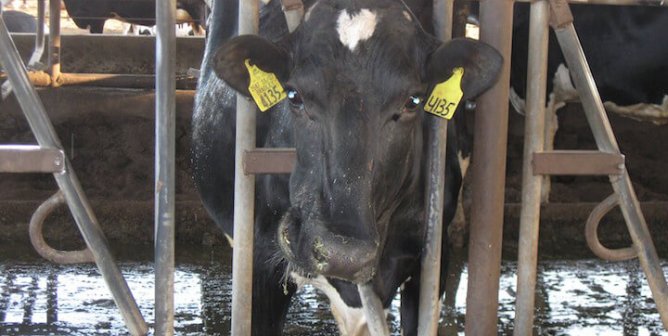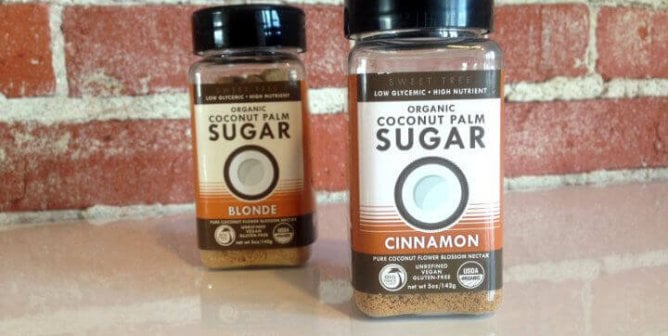Meat, eggs, and dairy products contain absolutely no fiber or complex carbohydrates, and they are packed with saturated fat and cholesterol. In the short term, eating meat, dairy products, and eggs is likely to make a person fat and lethargic. In the long term, eating these products can cause heart disease, high blood pressure, several types of cancer, and an array of other problems. I’d like to make a couple of points about human physiology, and then I’ll talk about the link between animal products and a few of the worst health scourges plaguing North Americans.
It’s amazing how many seemingly intelligent people, to justify their meat-eating, open their mouths, point at their teeth, and say something about “canines” as a means of defending a habit that is ecologically devastating, cruel to animals, and likely to kill them. Putting aside how different human “canines” are from the canine teeth of carnivores (I really wonder if these people have ever even looked at the long, dagger-like canines of a dog or a tiger), every natural carnivore has an array of other physiological properties that do not mirror ours. For example, unlike humans, all natural meat-eaters manufacture their own vitamin C, whereas we need to consume vitamin C in fruits and vegetables. True carnivores perspire through their tongues rather than through their skin. Natural meat-eaters have sharp, pointy front teeth, sharp and jagged molars, and a tooth-bone density that’s many times greater than that of humans, which enables them to crunch through the bones of their prey. Carnivores have no digestive enzymes in their saliva at all, and their digestive acids are many times more acidic than those of humans, so the bacteria from rotting flesh won’t kill them. Natural meat-eaters have jaws that move only vertically, instead of in a grinding motion as ours do, and they don’t chew their food—they just rip and swallow. Carnivores have claws to rip their prey apart instead of sensitive fingers for plucking. They have intestinal tracts that are only three times their body length, which enables them to eject rotting flesh quickly. No matter how much saturated fat and cholesterol they consume, natural meat-eaters never develop atherosclerosis, the heart disease that consistently kills more human beings in the industrialized world than any other cause of death. And the list of physiological differences between humans and natural meat-eaters goes on and on.
And let’s also think about this intuitively. How many of us salivate at the idea of chasing small animals, ripping them limb from limb, and then devouring them, blood and all? I hope that no one listening has that reaction, but every carnivore does. How many of us, if we’re walking down the street and see a recently run-over animal carcass on the road, think, “Mmmmmm … I’d like to eat that”? No. We think, “Oh, how sad” or “Blech.” A real carnivore, if hungry, digs in.
Yes, human beings learned, “Hey, if we kill all the bacteria and viruses with fire, this stuff probably won’t kill us.” And a long time ago, at times when there was little vegetation for us, we started eating meat. But it’s still not good for us, and in fact, it’s so bad for us that it kills many of us.
People will sometimes tell me that their doctor suggested that they eat meat or that their doctor says there’s no link between eating chicken and getting cancer. I suspect they’re making it up, since any doctor who said that would be offering advice that is contrary to every nutritional body in the world. There is not a single prominent medical or dietetic group that will tell you eating meat is good for you. On the pro-vegetarian side, we have an array of prominent medical groups and physicians, including Drs. Andrew Weil, Dean Ornish, Caldwell Esselstyn, T. Colin Campbell, Neal Barnard, and the list goes on. On the pro-meat side, there is literally one guy (seriously, just one)—Robert Atkins, who keeled over dead at 260 pounds in 2003, and whose company went bankrupt shortly thereafter.
The American Dietetic Association, the world’s largest organization of nutrition professionals, performed an extensive review of all the scientific studies about vegetarian diets. They found that vegetarians have lower rates of heart disease, diabetes, high blood pressure, cancer, and obesity than meat-eaters and wrote a position paper on vegetarian and vegan diets, which concluded that vegetarian and vegan diets are appropriate for all stages, including infancy and pregnancy, and that in fact they have “health benefits in the prevention and treatment of certain diseases.”
So on the side that says you should eat some meat, we have not one medical or dietetic group in the world, but one guy who dropped dead at more than 260 pounds (and he was less than 6 feet tall, by the way). On the other side, we have some of the most prominent doctors and nutritional researchers in the world and all the scientific and medical bodies that exist. So if your friend says that her doctor told her to eat meat, if it’s true, she really needs to find another doctor.
I know that when I adopted a vegetarian diet, I found that I needed less sleep and less coffee, and I suddenly had more energy than I had ever had before; my 10K running time dropped by more than 15 percent, and I’d been running cross country for years. The reason is that I was working with my physiology rather than against it—not forcing my body to expend so much energy digesting foods that it was not designed to digest.
Consider a study from a school for troubled youth in Miami. Dr. Antonia Demas from Cornell University put kids there on a vegan diet, resulting in the Miami Herald headline “Brain Food: Student Vegans See Boost in Grades, Energy.” School Principal Mary Louise Cole explained that the students “seem to have a lot more energy—they don’t have the down times.” One of the students, Gabriel Saintvil, stated, “I used to get tired when I ran laps or lifted weights. Now I get endurance and keep on doing it.”
It works for adults too. Carl Lewis, named “Olympian of the Century” by Sports Illustrated, says, “[M]y best year of track competition was the first year I ate a vegan diet. Moreover, by continuing to eat a vegan diet, my weight is under control, I like the way I look.”
And Atlanta Hawks guard Salim Stoudamire reports that after becoming vegan, “I’m in better condition. My endurance has gone up, and I haven’t gotten tired at all during the whole season.”
Vegetarianism is also the ultimate weight-loss diet, since vegetarians are one-third as likely to be obese as meat-eaters are, and vegans are about one-tenth as likely to be obese. You can be an overweight vegan, of course, and you can be a skinny meat-eater. But on average, vegans are 10 to 20 percent lighter than meat-eaters. Anyone who has questions about this might want to read Dr. Neal Barnard’s Food for Life or Dr. Dean Ornish’s Eat More, Weigh Less. Of course, we also have more information about vegetarianism and weight loss here on GoVeg.com.
Beyond the short-term benefits of vegetarianism and veganism—energy, weight control, and the like—America’s two biggest killers, heart disease and cancer, are inextricably linked to meat consumption.
Let’s touch on heart disease first. Heart disease kills more people in North America than does any other cause of death. Up until the 1980s, it was assumed that as people get older, their arteries inevitably become clogged. If you didn’t get hit by a bus or die of cancer or something else, your arteries would eventually close, causing either your brain or your heart to give out, and that would be it. Enter Dean Ornish and Caldwell Esselstyn, two doctors with 100 percent success in preventing and reversing heart disease, using a vegan diet. If you know someone who has had a heart attack or suffers from heart problems, please stop listening right now and buy him or her Dr. Esselstyn’s book, Prevent & Reverse Heart Disease, which details his work at the top heart clinic in the world, The Cleveland Clinic. He details both the skepticism of his colleagues and also his 100 percent success in taking people with advanced stages of heart disease, people who were told by their cardiologists that they were going to die, and stopping the disease in its tracks. The book will change his or her life—I promise.
The average vegan cholesterol level is about 133, while the average vegetarian cholesterol level is 161. And the average meat-eater’s cholesterol level is 210. Although the medical establishment may say, “Well, you’ve done your best,” at 210, people are still dying in droves. As Dr. Charles Attwood pointed out, this is insane: If people were being run down by trucks at the same rate that they’re dying from heart attacks induced by meat, eggs, and dairy products, drastic steps would be taken.
And the same is true of cancer. There is complete scientific unanimity: As many cases of cancer are caused by diet as are caused by smoking. And it is also completely clear how we can prevent cancer. The World Cancer Research Fund, the American Cancer Society, and the Royal Cancer Society in Britain—and essentially, all organizations that study the issue—agree that as many cases of cancer are caused by diet as are caused by smoking, and all of them make the same top two recommendations for preventing cancer: Eat more plant-based foods, and eat fewer animal-based foods. In other words, “Go vegan.”
Dr. T. Colin Campbell is one of the world’s foremost epidemiological scientists and the director of what The New York Times called “the most comprehensive large study ever undertaken of the relationship between diet and the risk of developing disease.” Dr. Campbell’s best-selling book, The China Study, is a must-read for anyone who is concerned about cancer. To summarize it, Dr. Campbell states that “human studies also support this carcinogenic effect of animal protein, even at usual levels of consumption. … No chemical carcinogen is nearly so important in causing human cancer as animal protein.” Just to be clear, it’s not the fat and cholesterol that cause cancer—it’s the animal protein. The fat and cholesterol cause heart disease; the animal protein causes cancer.
But what about milk? The fact that the dairy industry has succeeded in selling people on this nonsense—that cow’s milk is good for them—is truly remarkable and a tribute to the power of money and advertising. What could be less natural than one species’ decision to consume the mammary secretions of another species? It’s not as if nature made a mistake—”Let’s see, dog mothers’ milk for puppies, kangaroo mothers’ milk for joeys, rat mothers’ milk for baby rats, cow mothers’ milk for calves … oh, hey, wait a minute! Let’s feed cow mammary secretions to human beings also, including grown-up ones, who shouldn’t be drinking any mothers’ milk at their age anyway.” Of course not.
Nevertheless, the dairy industry would have us believe that consuming its products will protect and even build your bones. The fact is that clinical and population evidence shows us otherwise. For example, in the areas of the world where people consume the most dairy products, you find the highest rates of osteoporosis. Please check out PETA’s Web site to learn about the link between meat and dairy consumption and osteoporosis. What dairy researchers do is lavish money on a handful of researchers and then desperately spin the results of studies in a rather Orwellian manner. In fact, the one time the dairy industry actually did a clinical trial with milk, it found that milk was positively linked with bone deterioration. Population studies have found the same, as detailed on our Web site.
Finally, because many people care more about quality of life than about longevity, let’s look at sex. Vegans tend to be much lighter than ovo-lacto vegetarians and meat-eaters, and they tend to have more energy, need less sleep, and so on. Clearly, these aspects of veganism can be good for a person’s sex life. But clogged arteries will block the blood flow to your extremities before they cut off the blood flow to your heart and kill you. This results in poor circulation and, for guys, impotence. And while we’re on the subject, it’s worth noting that many cholesterol-cutting drugs have, as one of their side effects, reduced sexual desire and potency. So toss out the Viagra, gentlemen; a vegan diet is natural Viagra.
All this analysis applies to fish flesh as well as to other animal products: Fish flesh also has no fiber or complex carbohydrates. Most frighteningly, fish are also frequently laden with heavy metals or other contaminants from the water in which they swim. We’ve all heard the warnings about high mercury levels in fish and how pregnant women shouldn’t consume fish; well, if it’s not good for pregnant women, it can’t be good for anyone else either. In 2005, The Wall Street Journal ran a front-page story about a kid who went from being an honor student and star athlete to being in remedial classes and unable to catch a ball, purely from eating a can of tuna a day. In 2006, the Chicago Tribune did a three-part front-page story, titled “Mercury Menace,” about the fact that eating fish is linked to both short-term health problems, like forgetfulness and vertigo, and more serious problems, like birth defects, cancer, and so on. You can read these stories on our Web site. Suffice it to say, fish is probably the most dangerous so-called food you can eat, as we document on the site.
And of course, all this discussion has been about animal products when they’re at their best. That is, these are problems inherent in the consumption of meat, including organic meat. But most animal products are also full of antibiotics, dioxin, and foodborne pathogens like E. coli, salmonella, and campylobacter. Millions of people get sick each year from eating contaminated meat, especially the flesh of chickens and sea animals, and thousands die. According to the Environmental Protection Agency (EPA), consumers of meat and dairy products are taking in 22 times the acceptable level of dioxin in their food. Ninety-five percent of dioxin exposure comes from consuming meat, eggs, and dairy products. The other 5 percent is environmental; virtually none comes from consuming vegan foods.
Of course, this also all applies for kids, in spades. Kids’ bodies are developing, so you really don’t want them eating meat, dairy products, and eggs. And check out another benefit of raising your child as a vegetarian. A BBC story in December 2006 reported on a British Medical Journal study that “found [children] who were vegetarian by 30 had recorded five IQ points more on average at the age of 10. Researchers said it could explain why people with higher IQ were healthier as a vegetarian diet was linked to lower heart disease and obesity rates.” This study is backed up by the grandfather of child care, Dr. Benjamin Spock, who wrote, “Children who grow up getting their nutrition from plant foods rather than meats have a tremendous health advantage. They are less likely to develop weight problems, diabetes, high blood pressure, and some forms of cancer.”
If you care about your health, if you want to live with as much vigor as possible, look as good as possible, and do as much good as possible, it would be wise to move toward adopting a vegetarian diet.





